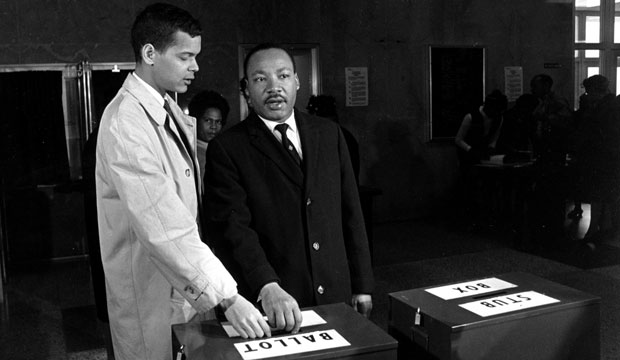By Ben Jealous

SOURCE: AP Photo
Julian Bond and Dr. Martin Luther King Jr. cast their ballots to fill Bond’s vacant seat in the U.S. House of Representatives in Atlanta on February 23, 1966.
- Download the report:
PDF
The 1964 Mississippi Freedom Summer was a pivotal moment for democracy in America. Yet 50 years later, despite many gains at the local level, the dream of Freedom Summer remains largely unrealized in the stretch of heavily black southern states known as the Black Belt. There are a number of significant and troubling signs:
- Large numbers of black voters and voters of color remain unregistered.
- New waves of voter suppression laws are being passed, and they have taken a form not seen since the rise of Jim Crow laws.
- The general wisdom in many Black Belt states remains that when it comes to winning statewide office, candidates who support the views and concerns of people of color simply do not have a chance.
Nevertheless, the Black Belt region is in a state of change. Waves of black remigration and Latino and Asian immigration are infusing Black Belt states with a more diverse, more tolerant, and more progressive population. At the same time, extreme right-wing attacks on women’s rights, as well as a rising generation of increasingly tolerant young white voters, have begun to increase the possibilities for successful multiracial voter coalitions and candidates of color at the statewide level.
This report examines the conditions in the Black Belt today and identifies lessons from Freedom Summer that can help today’s political organizers build a more inclusive Black Belt.
The first and most important lesson is that massive voter registration can overcome massive voter suppression. Our analysis shows that registering just 30 percent of eligible unregistered black voters or other voters of color could shift the political calculus in a number of Black Belt states, helping blacks elect candidates who share their concerns or alternatively, forcing all candidates to pay attention to the community’s concerns. Registering 60 percent or 90 percent would change the political calculus in an even greater number of states.
However, if organizers seek to maintain this progress in the long term, they must also embrace two other lessons from Freedom Summer. The second lesson is that coalition building is the key to transformative political power. The third is that successful movement is a marathon, not a sprint.
Taken together, these three lessons can provide the tactical framework for advancing inclusion and unleashing democracy in the Black Belt.
Ben Jealous is a Senior Fellow at American Progress.















